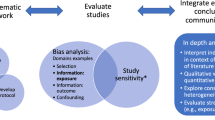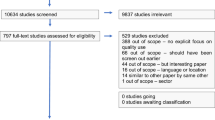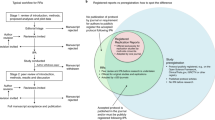Abstract
Traditional approaches to reviewing literature may be susceptible to bias and result in incorrect decisions. This is of particular concern when reviews address policy- and practice-relevant questions. Systematic reviews have been introduced as a more rigorous approach to synthesizing evidence across studies; they rely on a suite of evidence-based methods aimed at maximizing rigour and minimizing susceptibility to bias. Despite the increasing popularity of systematic reviews in the environmental field, evidence synthesis methods continue to be poorly applied in practice, resulting in the publication of syntheses that are highly susceptible to bias. Recognizing the constraints that researchers can sometimes feel when attempting to plan, conduct and publish rigorous and comprehensive evidence syntheses, we aim here to identify major pitfalls in the conduct and reporting of systematic reviews, making use of recent examples from across the field. Adopting a ‘critical friend’ role in supporting would-be systematic reviews and avoiding individual responses to police use of the ‘systematic review’ label, we go on to identify methodological solutions to mitigate these pitfalls. We then highlight existing support available to avoid these issues and call on the entire community, including systematic review specialists, to work towards better evidence syntheses for better evidence and better decisions.
This is a preview of subscription content, access via your institution
Access options
Access Nature and 54 other Nature Portfolio journals
Get Nature+, our best-value online-access subscription
$29.99 / 30 days
cancel any time
Subscribe to this journal
Receive 12 digital issues and online access to articles
$119.00 per year
only $9.92 per issue
Buy this article
- Purchase on Springer Link
- Instant access to full article PDF
Prices may be subject to local taxes which are calculated during checkout

Similar content being viewed by others
Change history
19 October 2020
An amendment to this paper has been published and can be accessed via a link at the top of the paper.
References
Grant, M. J. & Booth, A. A typology of reviews: an analysis of 14 review types and associated methodologies. Health Info Libr. J. 26, 91–108 (2009).
Haddaway, N. R. & Macura, B. The role of reporting standards in producing robust literature reviews. Nat. Clim. Change 8, 444–447 (2018).
Pullin, A. S. & Knight, T. M. Science informing policy–a health warning for the environment. Environ. Evid. 1, 15 (2012).
Haddaway, N., Woodcock, P., Macura, B. & Collins, A. Making literature reviews more reliable through application of lessons from systematic reviews. Conserv. Biol. 29, 1596–1605 (2015).
Pullin, A., Frampton, G., Livoreil, B. & Petrokofsky, G. Guidelines and Standards for Evidence Synthesis in Environmental Management (Collaboration for Environmental Evidence, 2018).
White, H. The twenty-first century experimenting society: the four waves of the evidence revolution. Palgrave Commun. 5, 47 (2019).
O’Leary, B. C. et al. The reliability of evidence review methodology in environmental science and conservation. Environ. Sci. Policy 64, 75–82 (2016).
Woodcock, P., Pullin, A. S. & Kaiser, M. J. Evaluating and improving the reliability of evidence syntheses in conservation and environmental science: a methodology. Biol. Conserv. 176, 54–62 (2014).
Campbell Systematic Reviews: Policies and Guidelines (Campbell Collaboration, 2014).
Higgins, J. P. et al. Cochrane Handbook for Systematic Reviews of Interventions (John Wiley & Sons, 2019).
Shea, B. J. et al. AMSTAR 2: a critical appraisal tool for systematic reviews that include randomised or non-randomised studies of healthcare interventions, or both. BMJ 358, j4008 (2017).
Haddaway, N. R., Land, M. & Macura, B. “A little learning is a dangerous thing”: a call for better understanding of the term ‘systematic review’. Environ. Int. 99, 356–360 (2017).
Freeman, R. E. Strategic Management: A Stakeholder Approach (Cambridge Univ. Press, 2010).
Haddaway, N. R. et al. A framework for stakeholder engagement during systematic reviews and maps in environmental management. Environ. Evid. 6, 11 (2017).
Land, M., Macura, B., Bernes, C. & Johansson, S. A five-step approach for stakeholder engagement in prioritisation and planning of environmental evidence syntheses. Environ. Evid. 6, 25 (2017).
Oliver, S. & Dickson, K. Policy-relevant systematic reviews to strengthen health systems: models and mechanisms to support their production. Evid. Policy 12, 235–259 (2016).
Savilaakso, S. et al. Systematic review of effects on biodiversity from oil palm production. Environ. Evid. 3, 4 (2014).
Savilaakso, S., Laumonier, Y., Guariguata, M. R. & Nasi, R. Does production of oil palm, soybean, or jatropha change biodiversity and ecosystem functions in tropical forests. Environ. Evid. 2, 17 (2013).
Haddaway, N. R. & Crowe, S. Experiences and lessons in stakeholder engagement in environmental evidence synthesis: a truly special series. Environ. Evid. 7, 11 (2018).
Sánchez-Bayo, F. & Wyckhuys, K. A. Worldwide decline of the entomofauna: a review of its drivers. Biol. Conserv. 232, 8–27 (2019).
Agarwala, M. & Ginsberg, J. R. Untangling outcomes of de jure and de facto community-based management of natural resources. Conserv. Biol. 31, 1232–1246 (2017).
Gurevitch, J., Curtis, P. S. & Jones, M. H. Meta-analysis in ecology. Adv. Ecol. Res. 32, 199–247 (2001).
Haddaway, N. R., Macura, B., Whaley, P. & Pullin, A. S. ROSES RepOrting standards for Systematic Evidence Syntheses: pro forma, flow-diagram and descriptive summary of the plan and conduct of environmental systematic reviews and systematic maps. Environ. Evid. 7, 7 (2018).
Lwasa, S. et al. A meta-analysis of urban and peri-urban agriculture and forestry in mediating climate change. Curr. Opin. Environ. Sustain. 13, 68–73 (2015).
Pacifici, M. et al. Species’ traits influenced their response to recent climate change. Nat. Clim. Change 7, 205–208 (2017).
Owen-Smith, N. Ramifying effects of the risk of predation on African multi-predator, multi-prey large-mammal assemblages and the conservation implications. Biol. Conserv. 232, 51–58 (2019).
Prugh, L. R. et al. Designing studies of predation risk for improved inference in carnivore-ungulate systems. Biol. Conserv. 232, 194–207 (2019).
Li, Y. et al. Effects of biochar application in forest ecosystems on soil properties and greenhouse gas emissions: a review. J. Soil Sediment. 18, 546–563 (2018).
Moher, D., Liberati, A., Tetzlaff, J. & Altman, D. G., The PRISMA Group. Preferred reporting items for systematic reviews and meta-analyses: the PRISMA statement. PLoS Med. 6, e1000097 (2009).
Bernes, C. et al. What is the influence of a reduction of planktivorous and benthivorous fish on water quality in temperate eutrophic lakes? A systematic review. Environ. Evid. 4, 7 (2015).
McDonagh, M., Peterson, K., Raina, P., Chang, S. & Shekelle, P. Avoiding bias in selecting studies. Methods Guide for Effectiveness and Comparative Effectiveness Reviews [Internet] (Agency for Healthcare Research and Quality, 2013).
Burivalova, Z., Hua, F., Koh, L. P., Garcia, C. & Putz, F. A critical comparison of conventional, certified, and community management of tropical forests for timber in terms of environmental, economic, and social variables. Conserv. Lett. 10, 4–14 (2017).
Min-Venditti, A. A., Moore, G. W. & Fleischman, F. What policies improve forest cover? A systematic review of research from Mesoamerica. Glob. Environ. Change 47, 21–27 (2017).
Bramer, W. M., Giustini, D. & Kramer, B. M. R. Comparing the coverage, recall, and precision of searches for 120 systematic reviews in Embase, MEDLINE, and Google Scholar: a prospective study. Syst. Rev. 5, 39 (2016).
Bramer, W. M., Giustini, D., Kramer, B. M. R. & Anderson, P. F. The comparative recall of Google Scholar versus PubMed in identical searches for biomedical systematic reviews: a review of searches used in systematic reviews. Syst. Rev. 2, 115 (2013).
Gusenbauer, M. & Haddaway, N. R. Which academic search systems are suitable for systematic reviews or meta‐analyses? Evaluating retrieval qualities of Google Scholar, PubMed, and 26 other resources. Res. Synth. Methods 11, 181–217 (2020).
Livoreil, B. et al. Systematic searching for environmental evidence using multiple tools and sources. Environ. Evid. 6, 23 (2017).
Mlinarić, A., Horvat, M. & Šupak Smolčić, V. Dealing with the positive publication bias: why you should really publish your negative results. Biochem. Med. 27, 447–452 (2017).
Lin, L. & Chu, H. Quantifying publication bias in meta‐analysis. Biometrics 74, 785–794 (2018).
Haddaway, N. R. & Bayliss, H. R. Shades of grey: two forms of grey literature important for reviews in conservation. Biol. Conserv. 191, 827–829 (2015).
Viechtbauer, W. Conducting meta-analyses in R with the metafor package. J. Stat. Softw. 36, 1–48 (2010).
Bilotta, G. S., Milner, A. M. & Boyd, I. On the use of systematic reviews to inform environmental policies. Environ. Sci. Policy 42, 67–77 (2014).
Englund, G., Sarnelle, O. & Cooper, S. D. The importance of data‐selection criteria: meta‐analyses of stream predation experiments. Ecology 80, 1132–1141 (1999).
Burivalova, Z., Şekercioğlu, Ç. H. & Koh, L. P. Thresholds of logging intensity to maintain tropical forest biodiversity. Curr. Biol. 24, 1893–1898 (2014).
Bicknell, J. E., Struebig, M. J., Edwards, D. P. & Davies, Z. G. Improved timber harvest techniques maintain biodiversity in tropical forests. Curr. Biol. 24, R1119–R1120 (2014).
Damette, O. & Delacote, P. Unsustainable timber harvesting, deforestation and the role of certification. Ecol. Econ. 70, 1211–1219 (2011).
Blomley, T. et al. Seeing the wood for the trees: an assessment of the impact of participatory forest management on forest condition in Tanzania. Oryx 42, 380–391 (2008).
Haddaway, N. R. et al. How does tillage intensity affect soil organic carbon? A systematic review. Environ. Evid. 6, 30 (2017).
Higgins, J. P. et al. The Cochrane Collaboration’s tool for assessing risk of bias in randomised trials. BMJ 343, d5928 (2011).
Stewart, G. Meta-analysis in applied ecology. Biol. Lett. 6, 78–81 (2010).
Koricheva, J. & Gurevitch, J. Uses and misuses of meta‐analysis in plant ecology. J. Ecol. 102, 828–844 (2014).
Vetter, D., Ruecker, G. & Storch, I. Meta‐analysis: a need for well‐defined usage in ecology and conservation biology. Ecosphere 4, 1–24 (2013).
Stewart, G. B. & Schmid, C. H. Lessons from meta-analysis in ecology and evolution: the need for trans-disciplinary evidence synthesis methodologies. Res. Synth. Methods 6, 109–110 (2015).
Macura, B. et al. Systematic reviews of qualitative evidence for environmental policy and management: an overview of different methodological options. Environ. Evid. 8, 24 (2019).
Koricheva, J. & Gurevitch, J. in Handbook of Meta-analysis in Ecology and Evolution (eds Koricheva, J. et al.) Ch. 1 (Princeton Scholarship Online, 2013).
Britt, M., Haworth, S. E., Johnson, J. B., Martchenko, D. & Shafer, A. B. The importance of non-academic coauthors in bridging the conservation genetics gap. Biol. Conserv. 218, 118–123 (2018).
Graham, L., Gaulton, R., Gerard, F. & Staley, J. T. The influence of hedgerow structural condition on wildlife habitat provision in farmed landscapes. Biol. Conserv. 220, 122–131 (2018).
Delaquis, E., de Haan, S. & Wyckhuys, K. A. On-farm diversity offsets environmental pressures in tropical agro-ecosystems: a synthetic review for cassava-based systems. Agric. Ecosyst. Environ. 251, 226–235 (2018).
Popay, J. et al. Guidance on the Conduct of Narrative Synthesis in Systematic Reviews: A Product from the ESRC Methods Programme Version 1 (Lancaster Univ., 2006).
Pullin, A. S. et al. Human well-being impacts of terrestrial protected areas. Environ. Evid. 2, 19 (2013).
Waffenschmidt, S., Knelangen, M., Sieben, W., Bühn, S. & Pieper, D. Single screening versus conventional double screening for study selection in systematic reviews: a methodological systematic review. BMC Med. Res. Methodol. 19, 132 (2019).
Rallo, A. & García-Arberas, L. Differences in abiotic water conditions between fluvial reaches and crayfish fauna in some northern rivers of the Iberian Peninsula. Aquat. Living Resour. 15, 119–128 (2002).
Glasziou, P. & Chalmers, I. Research waste is still a scandal—an essay by Paul Glasziou and Iain Chalmers. BMJ 363, k4645 (2018).
Haddaway, N. R. Open Synthesis: on the need for evidence synthesis to embrace Open Science. Environ. Evid. 7, 26 (2018).
Acknowledgements
We thank C. Shortall from Rothamstead Research for useful discussions on the topic.
Author information
Authors and Affiliations
Contributions
N.R.H. developed the manuscript idea and a first draft. All authors contributed to examples and edited the text. All authors have read and approve of the final submission.
Corresponding author
Ethics declarations
Competing interests
S.S. is a co-founder of Liljus ltd, a firm that provides research services in sustainable finance as well as forest conservation and management. The other authors declare no competing interests.
Additional information
Publisher’s note Springer Nature remains neutral with regard to jurisdictional claims in published maps and institutional affiliations.
Supplementary information
Supplementary Table
Examples of literature reviews and common problems identified.
Rights and permissions
About this article
Cite this article
Haddaway, N.R., Bethel, A., Dicks, L.V. et al. Eight problems with literature reviews and how to fix them. Nat Ecol Evol 4, 1582–1589 (2020). https://doi.org/10.1038/s41559-020-01295-x
Received:
Accepted:
Published:
Issue Date:
DOI: https://doi.org/10.1038/s41559-020-01295-x
This article is cited by
-
A review of the necessity of a multi-layer land-use planning
Landscape and Ecological Engineering (2024)
-
Synthesizing the relationships between environmental DNA concentration and freshwater macrophyte abundance: a systematic review and meta-analysis
Hydrobiologia (2024)
-
A Systematic Review of the Effects of Multi-purpose Forest Management Practices on the Breeding Success of Forest Birds
Current Forestry Reports (2024)
-
Parasitism in viviparous vertebrates: an overview
Parasitology Research (2024)
-
Environmental evidence in action: on the science and practice of evidence synthesis and evidence-based decision-making
Environmental Evidence (2023)



